 September 12, 2019 John E. Ross, KD8IDJ, Editor
| ||||||
ARRL and IARU President Emeritus Larry Price, W4RA, SK ARRL and International Amateur Radio Union (IARU) President Emeritus Larry E. Price, W4RA, of Statesboro, Georgia, died on September 10. An ARRL Life Member, he was 85. Price was licensed in 1951 at age 16 as WN5TIA, one of the first Novice licenses issued in the US. A US Army veteran, Price held BSEE, MBA, and doctoral degrees. He spent most of his career as a professor of finance and economics at Georgia Southern University.
He served as ARRL President for 8 years, serving simultaneously as IARU Secretary from 1989 until 1992, and continuing as IARU Secretary and ARRL International Affairs Vice President until his election as IARU President in 1999, a post he held for 10 years. The IARU Administrative Council named him President Emeritus upon his retirement in 2009. The ARRL Board named him ARRL President Emeritus in 2011. "His accomplishments as President of ARRL and the IARU are too many to list, but neither organization would be what it is today without his vision, dedication, and hard work," said former ARRL CEO David Sumner, K1ZZ, who now serves as IARU Secretary. "We all owe a great debt to Larry and his family for their many sacrifices on our behalf." IARU President Tim Ellam, VE6SH, recalled his many years of association with Price. "Amateur Radio...has lost a valued colleague today," Ellam said. "Larry Price was the dean of the IARU, and under his leadership the organization not only achieved great success for the Amateur Radio services but the respect of those we work with in the International Telecommunication Union (ITU). His work and tenacity on a number of issues gave the IARU the admiration of many administrations and senior leadership at the ITU, which we continue to enjoy today." In 2014, Dayton Hamvention® honored Price as Amateur of the Year. At the ARRL Centennial Convention that same year, Price was awarded the ARRL Medal of Honor. Read more. -- Thanks to David Sumner, K1ZZ FCC Proposes to Make All Universal Licensing System Filings Electronic The FCC is seeking comment on a Notice of Proposed Rulemaking (NPRM) that is part of an overall plan to transition completely to electronic filing, licenses, authorizations, and correspondence. The notice proposes to make all filings to the Universal Licensing System (ULS) electronic, expand electronic filing and correspondence elements for related systems, and require applicants to provide an email address on the FCC forms related to these systems. Although much of the FCC's ULS filings are already electronic, the changes suggested in the NPRM (in WT Docket No. 19-212) would require all "Given the drastic changes that have occurred with regard to the ubiquity of the internet and increased personal computer access, we find it unlikely that electronic filing remains infeasible or cost-prohibitive for the previously exempted types of filers, or that they lack resources to file electronically," the FCC said in the NPRM, released on September 6. "We therefore propose to eliminate Section 1.913's exemptions to mandatory electronic filing." The FCC said that while the vast majority of ULS applications today are submitted electronically, some are still manually filed, largely from exempted filers, such as radio amateurs. Last year, the FCC received some 5,000 manually filed applications out of a total of some 425,000. The FCC is seeking comment on whether its underlying assumptions about the ease of electronic filing for previously exempted filers are valid. This NPRM also seeks comment on additional rule changes that would further expand the use of electronic filing and electronic service. The FCC stopped providing printed Amateur Radio license documents in 2015. "Together, these proposals will facilitate the remaining steps to transition these systems from paper to electronic, reducing regulatory burdens and environmental waste, and making interaction with these systems more accessible and efficient for those who rely on them," the FCC said. Comments are due within 30 days of the NPRM's release. Unraveling the Mystery of 1 × 1 Call Signs The 1 × 1 Special Event Call Signs system offers a way for clubs, groups, or even individuals to use a short call sign of special significance to the amateur community. These 1 × 1 call signs are reserved in advance for use in conjunction with short-term special events and commemorative operations. The FCC does not assign 1 × 1 call signs, so they are not "official." On the matter of special event call signs, the FCC says, in Section 97.3(a)(11)(iii) of the Amateur Service rules: "The call sign is selected by the station licensee from a list of call signs shown on a common database coordinated, maintained and disseminated by the amateur station special event call sign data base coordinators. The call sign must have the single letter prefix K, N, or W, followed by a single numeral 0 through 9, followed by a single letter A through W or Y or Z (for example K1A). The special event call sign is substituted for the call sign shown on the station license grant while the station is transmitting."
A 1 × 1 Special Event Call Sign aids other radio amateurs by calling attention to the special event or other occasion. 1 × 1 call signs may be used for a variety of purposes, such as conventions, festivals, dedications, anniversaries, commemorations, and ARRL Field Day. Even local events qualify. There are 750 1 × 1 Special Event Call Sign possibilities, and radio amateurs of any license class may reserve one as far as a year in advance to use for up to 15 days. Of course, 1 × 1 Special Event Call Signs are recycled. It's first come, first served. See the Frequently Asked Questions page for more information. The FCC has selected coordinators to approve and post 1 × 1 Special Event Call Sign reservations to a searchable database. -- Thanks to The Radiogram (Portage County Amateur Radio Society newsletter) The Doctor Will See You Now! "Coaxial Cable Connectors" is the topic of the new (September 12) episode of the ARRL The Doctor is In podcast. Listen...and learn!
Every 2 weeks, your host, QST Editor-in-Chief Steve Ford, WB8IMY, and the Doctor himself, Joel Hallas, W1ZR, will discuss a broad range of technical topics. You can also email your questions to doctor@arrl.org, and the Doctor may answer them in a future podcast. Enjoy ARRL The Doctor is In on Apple iTunes, or by using your iPhone or iPad podcast app (just search for ARRL The Doctor is In). You can also listen online at Blubrry, or at Stitcher (free registration required, or browse the site as a guest) and through the free Stitcher app for iOS, Kindle, or Android devices. If you've never listened to a podcast before, download our beginner's guide. Hurricane Watch Net Sets New Activation Record during Dorian Hurricane Watch Net (HWN) volunteers set a new record for total hours activated during a single storm. The net was active for 157 hours -- 139 hours of which were continuous. HWN Manager Bobby Graves, KB5HAV, said the continuous activation record stands at 151 hours for Hurricane Matthew in 2018.
After devastating Abaco and Grand Bahama islands with winds clocked at 200 MPH or more, Dorian made its way slowly toward Florida, before sliding up the southeastern US coast and making a second landfall on Cape Hatteras, North Carolina. It wasn't over, however. Dorian veered out into the Atlantic, affecting New England before hitting Maritime Canada, where it knocked out power and downed trees. During its lengthy initial activation, the HWN attempted on numerous occasions to raise stations in the Bahamas but was unable to contact anyone in the most-affected area. The HWN activated for the last time during Hurricane Dorian last Saturday, as the storm was, by then, speeding up the east coast of the US as a Category 1 storm. Poor propagation plagued net operations throughout the activation, even right up to the end. At one point, propagation was lost between net members and Nova Scotia on 40 meters, although the net continued for a while longer on 20 meters. Early on, Amateur Radio Emergency Service (ARES®) volunteers went on alert along the US east coast, preparing for the worst. The major problem was storm surge-related flooding. Evacuations were ordered ahead of the storm. The ARRL Headquarters Emergency Response Team convened early on to monitor the situation closely. ARRL officials were in regular communication with partner agencies, particularly FEMA and the Department of Homeland Security. W1AW, which had already planned to be in operation for the Hiram Percy Maxim 150th birthday special event, remained ready to assist with emergency communications. The VoIP Hurricane Net activated over the weekend in conjunction with WX4NHC at the National Hurricane Center to keep on top of ground-truth weather information. The K7RA Solar Update Tad Cook, K7RA, Seattle, reports: No sunspots this week. The average daily sunspot numbers declined from 3.4 to 0. At the same time, the average daily solar flux rose from 67.4 to 69.4. Geomagnetic activity quieted, with the average daily planetary A index declining from 19.9 to 8.9, while the average daily mid-latitude A index went from 16.7 to 7.7.
Predicted planetary A index is 5 on September 12 - 22; 8 on September 23; 5 on September 24 - 25; 10, 35, 45, 20, and 10 on September 26 - 30; 8, 10, and 8 on October 1 - 3; 5 on October 4 - 19; 8 on October 20; 5 on October 21 - 22; 8, 25, 30, and 18 on October 23 - 26. Sunspot numbers for September 5 - 11, 2019 were 0, 0, 0, 0, 0, 0, and 0, with a mean of 0. The 10.7-centimeter flux was 68.3, 68.9, 73.9, 67.5, 68.8, 70, and 68.1, with a mean of 69.4. Estimated planetary A indices were 14, 8, 7, 10, 14, 4, and 5, with a mean of 8.9. Middle latitude A index was 11, 9, 6, 9, 11, 4, and 4, with a mean of 7.7. A comprehensive K7RA Solar Update is posted Fridays on the ARRL website. For more information concerning radio propagation, visit the ARRL Technical Information Service, read "What the Numbers Mean...," and check out K9LA's Propagation Page. A propagation bulletin archive is available. Monthly charts offer propagation projections between the US and a dozen DX locations. Share your reports and observations. Just Ahead in Radiosport
Dayton Hamvention Signs 5-Year Contract with Greene County Expo Center The Dayton Amateur Radio Association (DARA) has signed a 5-year agreement to keep Dayton Hamvention® at the Greene County Expo Center. The agreement was announced on September 9 by Hamvention General Chairman Jack Gerbs, WB8SCT. "It has been a wonderful experience working with the Expo Center team in the development of this agreement," Gerbs said. "With the 5-year agreement signed, the Expo Center and Hamvention can move forward with additional enhancements to the facilities."
The largest Amateur Radio show in the US, Dayton Hamvention is held the third full weekend in May. The dates for 2020 are May 15 - 17. UN Headquarters' 4U1UN Making Slow but Steady Progress in Returning to Air Responding to inquiries noting the lack of 4U1UN activity, the United Nations Amateur Radio Club (UNARC) indicated on its Facebook page this week that it's making slow but steady progress in its efforts to get a station back on the air from UN Headquarters. The main difficulties in getting 4U1UN up and running again following its displacement by renovations at UN Headquarters have been administrative and organizational, the UNARC team said. The club explained that as a "After the successful activity of 4U70UN back in 2015, with the support of the UN Administration, we were able to secure a tiny 20-square-foot room for the club's needs on the ground floor of the building," the club said in its post. With no opportunity to run a feed line from the ground floor to the top of the building and the tenuous hold even on the tiny, bottom-floor shack space, the club is in the process of installing a remotely controlled station on the 41st floor. Over a recent weekend, several UNARC members, representatives of UN services, and guests had an opportunity to continue equipment configuration. An assembled 19-inch rack and part of the equipment UNARC says remote access from the 1st floor now works, thanks to a separate Ethernet cable run up the entire height of the building for UNARC's use. Operation of the ACOM-2000A amplifier also was tested with an antenna. "We really hope that in the very near future, after debugging and setting up all the equipment, we will finally be able to proudly look at the work done and begin to appear steadily on the bands," the club said. YOTA 2019 Summer Camp in Bulgaria Spawns Subregional Camps Most of those attending the recent Youngsters on the Air (YOTA) summer camp in Bulgaria were first-timers, observed Monty Schebesta, OE3VVU, a participant this year. Some 80 young radio During the week, campers engaged in a variety of workshops that included such activities as building VHF and HF antennas and assembling electronic kits, which, for many, meant learning how to solder. Monty said the focus of the activities and presentations involved learning from each other. "YOTA is shifting more and more towards a 'youngsters for youngsters' approach, where youngsters teach each other, rather than relying on older generations for input," he said. "The main goal of the YOTA summer camp is to give youngsters the ideas, knowledge, and experiences they require to go back to their home country at the end of the week and start their own youth activities."
Subregional camps such as those held in Finland, Italy, and Germany in recent years are becoming more common in Region 1, with the next set for late September in the Czech Republic (OL19CAMP), followed closely by a camp in the Netherlands in December. He anticipates many other youth teams will want to stage subregional YOTA camps of their own. "What the participants learned at the YOTA summer camp will be an invaluable resource for organizing subregional camps and youth activities on any scale," he concluded. Bulgaria's International Amateur Radio Union (IARU) member-society, BFRA, sponsored the 2019 YOTA Summer Camp. In Brief...
Upcoming ARRL Section, State, and Division Conventions
Find conventions and hamfests in your area.
. .
Subscribe to...
Free of charge to ARRL members...
| ||||||
(1).jpg) Elected as ARRL Southeastern Division Vice Director in 1973, Price became Director later that year and was elected as an ARRL Vice President by the Board of Directors in 1980. In 1983 he became First Vice President following the death of ARRL President Vic Clark, W4KFC, and was elected President by the Board the following year.
Elected as ARRL Southeastern Division Vice Director in 1973, Price became Director later that year and was elected as an ARRL Vice President by the Board of Directors in 1980. In 1983 he became First Vice President following the death of ARRL President Vic Clark, W4KFC, and was elected President by the Board the following year..jpg) Amateur Radio Service applications to be filed electronically. Under current rules, Amateur Radio applications may still be filed manually, except those filed by Volunteer Examiner Coordinators (VECs).
Amateur Radio Service applications to be filed electronically. Under current rules, Amateur Radio applications may still be filed manually, except those filed by Volunteer Examiner Coordinators (VECs). The FCC also says in Section 97.119 (d): "Additionally, the station must transmit its assigned call sign at least once per hour during such transmissions." This requirement tends to be widely flouted, however.
The FCC also says in Section 97.119 (d): "Additionally, the station must transmit its assigned call sign at least once per hour during such transmissions." This requirement tends to be widely flouted, however.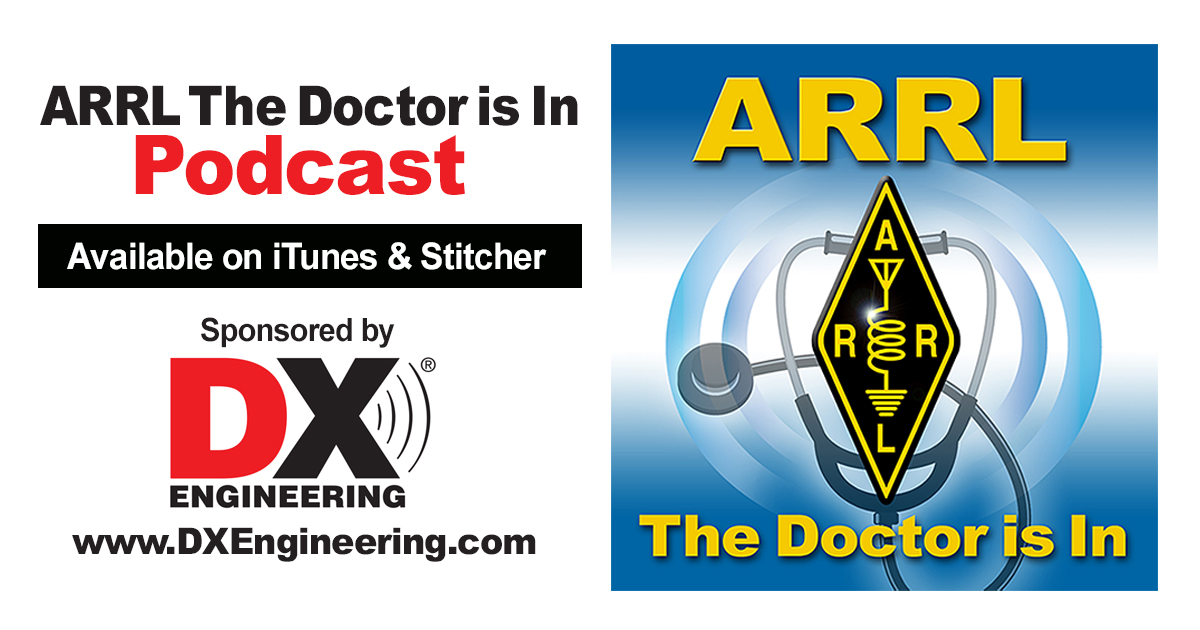 Sponsored by
Sponsored by .jpg) "During this marathon activation, members of the Hurricane Watch Net collected and forwarded countless surface reports to the National Hurricane Center in Miami," Graves noted.
"During this marathon activation, members of the Hurricane Watch Net collected and forwarded countless surface reports to the National Hurricane Center in Miami," Graves noted.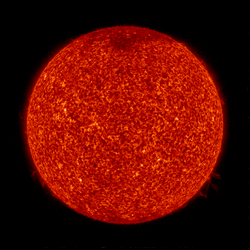 Predicted solar flux is 68 on September 12 - 22; 69 on September 23 - October 5; 68 on October 6 - 19; 69 on October 20 - 24; 68 on October 25, and 69 on October 26.
Predicted solar flux is 68 on September 12 - 22; 69 on September 23 - October 5; 68 on October 6 - 19; 69 on October 20 - 24; 68 on October 25, and 69 on October 26.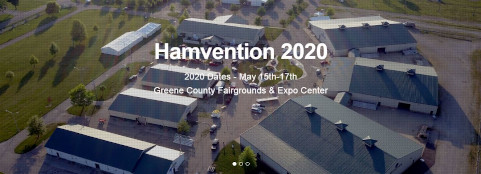 Dayton Amateur Radio Association President Ron Cramer, KD8ENJ, said the DARA Board, in approving the contract, noted that the relationship with the Expo Center and Greene County, the City of Xenia, and Xenia Township "has proven especially rewarding." Cramer said, "They all have worked hard to make Hamvention a success over the last 3 years. We look forward to a great relationship over the next 5 years and beyond." Hamvention's 2019 attendance was 32,472 -- the highest recorded since the move to the Exposition Center in Xenia in 2017, which was coordinated by Cramer, the Hamvention General Chairman in 2017 and 2018.
Dayton Amateur Radio Association President Ron Cramer, KD8ENJ, said the DARA Board, in approving the contract, noted that the relationship with the Expo Center and Greene County, the City of Xenia, and Xenia Township "has proven especially rewarding." Cramer said, "They all have worked hard to make Hamvention a success over the last 3 years. We look forward to a great relationship over the next 5 years and beyond." Hamvention's 2019 attendance was 32,472 -- the highest recorded since the move to the Exposition Center in Xenia in 2017, which was coordinated by Cramer, the Hamvention General Chairman in 2017 and 2018..jpg) result of UN Headquarters renovation, the room on the 41st floor housing the 4U1UN radio equipment was reallocated to the UN Broadcast and Conference Support Section (BCSS) and is now off limits.
result of UN Headquarters renovation, the room on the 41st floor housing the 4U1UN radio equipment was reallocated to the UN Broadcast and Conference Support Section (BCSS) and is now off limits.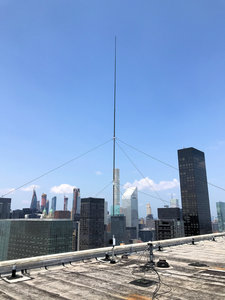 were disconnected during delivery to the 41st floor so that BCSS personnel could hand-carry the equipment up several flights of stairs to the top floor. "After 4 hours of work, the connections of the SteppIR BigIR vertical antennas were restored, a new SDA-100 controller was installed, and a RemoteRig 1216H was connected for easy remote access," the club post said. "The antenna was tested and configured."
were disconnected during delivery to the 41st floor so that BCSS personnel could hand-carry the equipment up several flights of stairs to the top floor. "After 4 hours of work, the connections of the SteppIR BigIR vertical antennas were restored, a new SDA-100 controller was installed, and a RemoteRig 1216H was connected for easy remote access," the club post said. "The antenna was tested and configured."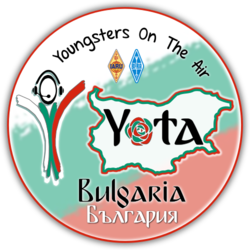 amateurs from 27 countries convened near Sofia August 11 - 17 to, as he put it, "connect and learn from each other." Monty said the successful 2019 summer camp demonstrated that YOTA is growing quickly, noting too that 40% of the YOTA Summer Camp attendees were young women.
amateurs from 27 countries convened near Sofia August 11 - 17 to, as he put it, "connect and learn from each other." Monty said the successful 2019 summer camp demonstrated that YOTA is growing quickly, noting too that 40% of the YOTA Summer Camp attendees were young women.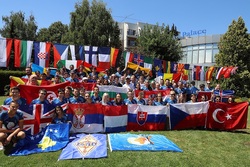 Monty said the practical workshops are the mostly easily reproducible, so that young radio amateurs could use them to introduce new young people into the hobby. "For example," he said, "youngsters might do a kit building workshop at a local school or use the antenna built at the camp to do a [Summits On The Air] activation together with some new youngsters."
Monty said the practical workshops are the mostly easily reproducible, so that young radio amateurs could use them to introduce new young people into the hobby. "For example," he said, "youngsters might do a kit building workshop at a local school or use the antenna built at the camp to do a [Summits On The Air] activation together with some new youngsters."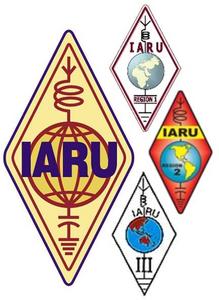 The IARU recently attended an ITU Inter-Regional Workshop. As part of its strategy to support topics related to Amateur Radio at World Radiocommunication Conference 2019 (
The IARU recently attended an ITU Inter-Regional Workshop. As part of its strategy to support topics related to Amateur Radio at World Radiocommunication Conference 2019 (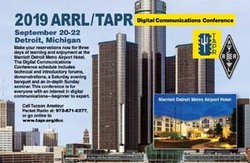 The
The 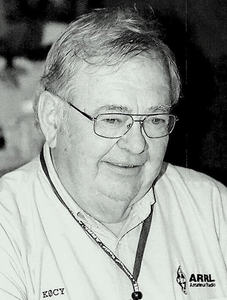 Former ARRL Iowa Section Manager Bob McCaffrey, K0CY, of Boone, Iowa, died on September 2. An ARRL Life Member, he was 77. McCaffrey served twice as Iowa Section Manager -- first, from 1980 until 1986, and again from 2013 until 2019, after he declined to run for another term. He served in other Iowa ARRL Field Organization positions as well. McCaffrey was licensed in 1955 as KN0EJZ. He taught entry-level Amateur Radio classes within adult education and served as a Volunteer Examiner. He was an AMSAT and Quarter Century Wireless Association member and an enthusiastic ARRL Field Day participant. McCaffrey was a past president of the Des Moines Radio Amateur Association and of the Boone Amateur Radio Club.
Former ARRL Iowa Section Manager Bob McCaffrey, K0CY, of Boone, Iowa, died on September 2. An ARRL Life Member, he was 77. McCaffrey served twice as Iowa Section Manager -- first, from 1980 until 1986, and again from 2013 until 2019, after he declined to run for another term. He served in other Iowa ARRL Field Organization positions as well. McCaffrey was licensed in 1955 as KN0EJZ. He taught entry-level Amateur Radio classes within adult education and served as a Volunteer Examiner. He was an AMSAT and Quarter Century Wireless Association member and an enthusiastic ARRL Field Day participant. McCaffrey was a past president of the Des Moines Radio Amateur Association and of the Boone Amateur Radio Club.







